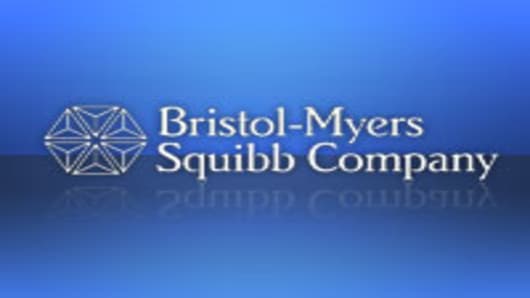Bristol-Myers Squibbposted a slight decline in third-quarter profit Tuesday as its restrained spending was offset by flat sales of its drugs, lower income from its partners and bigger discounts to government due to the health care overhaul.
Bristol-Myers, which sells blood thinner Plavix, the world's second best-selling drug, reported third-quarter net income of $949 million, or 55 cents per share. That's down nearly 2 percent from $966 million, or 48 cents per share, in the year-ago quarter.
Excluding several minor one-time items, the New York-based company said income would have been $1 billion, or 59 cents a share.
That beat the 53-cent expectation of analysts.
However, Bristol's $4.8 billion in sales was slightly below the consensus of analysts. They were expecting $4.92 billion.
Still, the company confirmed its 2010 profit forecast, given in July, for $1.84 to $1.94 a share, or $2.10 to $2.20 a share, excluding one-time items.
"Overall, a fair quarter for the company," BernsteinResearch analyst Dr. Timothy Anderson wrote in a note to investors. "Revenues were light, but higher gross margin, lower operating expenses and a lower tax rate more than overcame this."
Anderson noted Bristol lowered its revenue growth forecast, from mid-single-digit revenue growth this year to low- to mid-single-digit growth.
Bristol's revenues are expected to grow this year and next and then decline through 2015 because four of its top five sellers lose patent protection in that period.
Bristol-Myers said bigger discounts required for medicines the government buys for Medicaid patients, part of the U.S. health-care overhaul, reduced net sales in the quarter by 1.6 percent, or 2 cents per share.
The revenue decline also was due to lower sales of Bristol's No. 2 drug, Abilify for schizophrenia and bipolar disorder, as well as for cancer drug Erbitux and Avapro for high blood pressure.
In addition, unfavorable currency exchange rates reduced revenue from overseas sales by 3 percent, and Bristol's share of income from foreign sales of Plavix, which it shares with partner Sanofi-Aventis SA, fell by half due to increasing generic competition in Europe.
The year-ago quarter also included $91 million in net income from Bristol's interest in baby formula maker Mead Johnson Nutrition, which it sold off last December.
Otherwise, it was a relatively strong quarter for Bristol, which won U.S. approval of hepatitis B treatment Baraclude for liver failure caused by scarring and approval in Japan of its biologic drug for rheumatoid arthritis, Orencia.
Bristol has two other drugs with deadlines at the end of this week for U.S. regulators to rule on new uses: Sprycel for patients newly with diagnosed chronic myeloid leukemia and diabetes drug Onglyza in combination with metformin, a cheap, widely used starter drug for diabetes patients, respectively. The Onglyza-metformin combo also awaits approval in the European Union.
Sales of Onglyza, launched in summer 2009, have been disappointing so far, hitting only $47 million in the third quarter. But Plavix sales were strong, at $1.66 billion, and sales of Baraclude and HIV drugs Reyataz and Sustiva all were up.
Bristol slightly reduced spending in the quarter on administration, advertising and production, while keeping research investment even. The company said last month it is eliminating about 840 jobs out of 28,000 worldwide as it continues efforts to streamline.
Two weeks ago, Bristol wrapped up its $735 million purchase of Zymogenetics, a biotech company that sells Recothrom for reducing bleeding during surgeries. Together with Bristol, it's developing a promising hepatitis C treatment in midstage testing.
Shares of Bristol were down nearly 1 percent in New York trading Tuesday.


